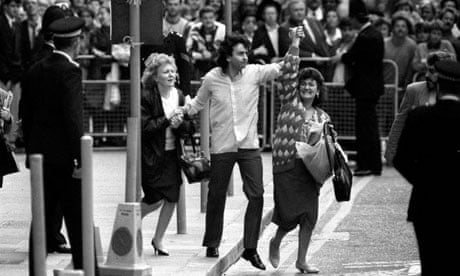Kenneth Clarke, the Home Secretary, indicated yesterday he hoped the furore over the Guildford Four case would finally be allowed to subside after an Old Bailey jury cleared three retired Surrey detectives of fabricating evidence.
Mr Clarke, speaking at the Police Federation conference in Blackpool, welcomed the verdict after a month-long trial. Delegates greeted the news with tumultuous applause.
"I am always glad to see innocent people acquitted," Mr Clarke said. "It enables everyone now to get that particular incident back in proportion. I hope now we can put this whole unhappy episode behind us."
Mr Justice Macpherson, the trial judge, said after yesterday's verdicts: "It seems to me that maybe the public and certainly those involved on the legal side would not wish to gaze at the entrails of the case further."
But the Four, whose murder convictions were quashed in October 1989, maintained that the officers' prosecution had degenerated into a re-trial of the Four. Their lawyers say more than a dozen issues surrounding the case remain unresolved.
An Old Bailey jury took more than eight hours to clear former detective chief inspector Thomas Style, aged 59, former detective sergeant John Donaldson, aged 57, and former detective constable Vernon Attwell, aged 52, of conspiracy to pervert the course of justice.
As they emerged to a media scrum, Mr Style said: "We are obviously tremendously relieved. It has been a tremendous ordeal for ourselves and particularly for our families."
Scott Ingram, solicitor for the men, whose legal costs were met by the Police Federation, said: "My clients are obviously grateful to the jury for its verdict, the right verdict.
"The jury has heard a great deal of evidence in the course of this trial that [Patrick] Armstrong did make admissions and in the terms recorded by these three gentlemen."
Alastair Logan, solicitor for Mr Armstrong and Carole Richardson, said: "The only chance the police had to be acquitted was to put Armstrong and [Gerry] Conlon on trial. That's what they have done.
"It's been a nonsense of a criminal trial. It is a con-trick, a dirty lousy con-trick. It is an attempt to re-write history, an attempt to reconvict the Four."
Mr Armstrong, now aged 43, said: "It was a whitewash from start to finish. I sometimes wondered why they even bothered to go through the motions."
Counsel for the police officers had been allowed by the trial judge, Mr Justice Macpherson, to make an address to the jury before the prosecution began calling witnesses. They alleged Mr Armstrong, whose interview records were the core of the trial, had "sung like a canary", and was an IRA member.
But the Balcombe Street gang, an IRA unit cornered at a siege in west London after a long mainland bombing campaign, admitted the Guildford and Woolwich bombings after they were arrested in 1975. Government scientists have admitted that forensic evidence to support their claims was suppressed.
Seven people died, and more than 60 were injured, in the Guildford and Woolwich pub bombings in late 1974. Patrick Armstrong, then 24, Paul Hill, 20, Gerry Conlon, 20, and Carole Richardson, 17, were convicted of the two Guildford bombings. Mr Hill and Mr Armstrong were also guilty of the Woolwich bombing, an Old Bailey jury decided in 1975.
The sole evidence against them was their confessions. They alleged officers had beaten and intimidated them at Guildford police station.
The Court of Appeal quashed the convictions in October 1989. Documents suggesting officers had fabricated supposedly contemporaneous handwritten notes of an interview with Mr Armstrong were discovered in the archives at Surrey police headquarters in Guildford.
The police officers stayed out of the Old Bailey witness box, offering no explanation for the existence of rough, typed notes. The prosecution alleged they had been used as a blueprint for the handwritten interview.
Sir John May, the former appeal court judge charged to investigate the Guildford convictions, is to take no public evidence because of delays in bringing the case to court. Solicitors for the Four claim senior figures in the prosecution were involved in a conspiracy wrongfully to convict their clients.








Comments (…)
Sign in or create your Guardian account to join the discussion